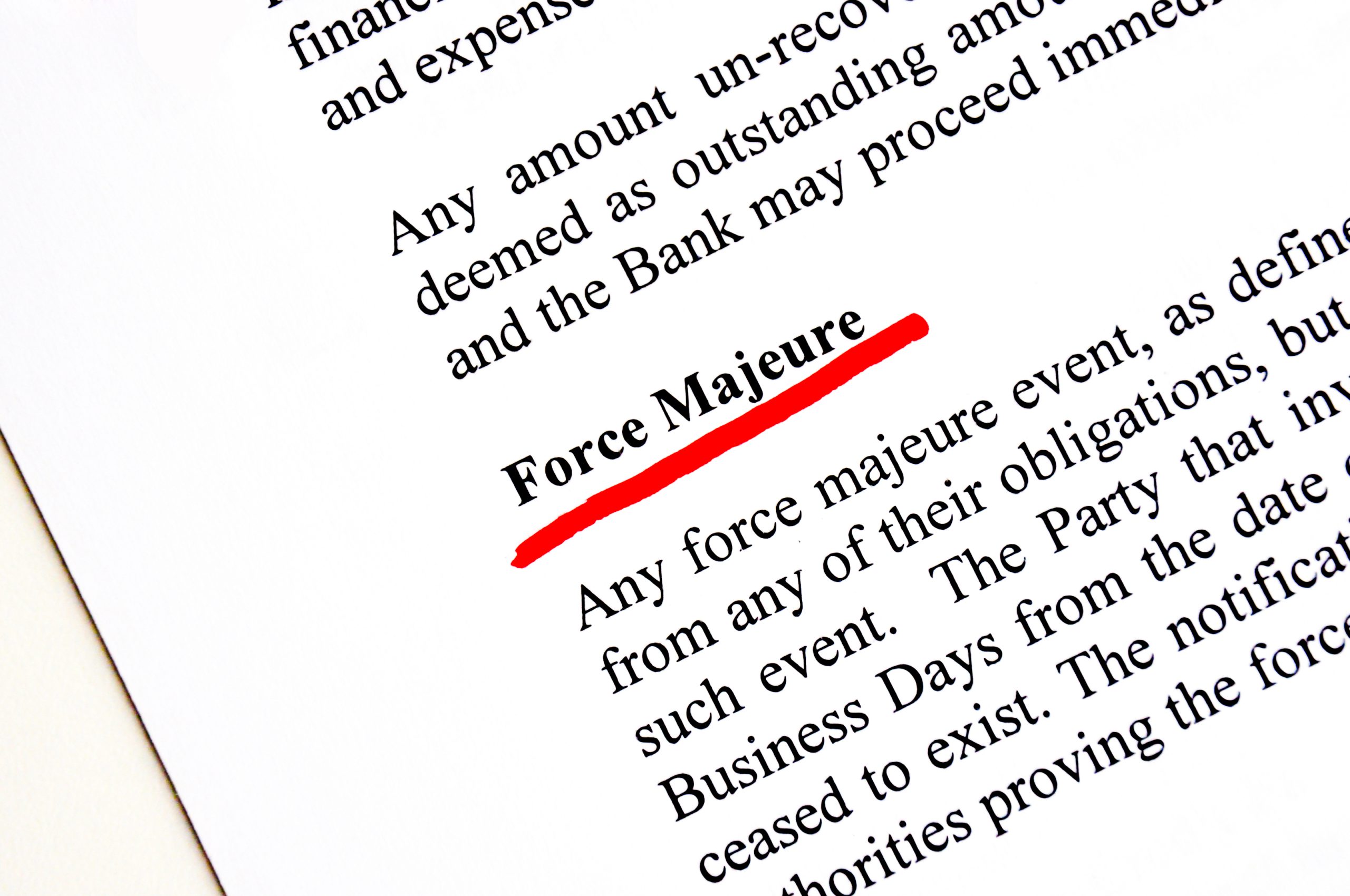FAQs: Force majeure, Frustration, and COVID-19

The legal consequences of COVID-19 related shutdowns and interruptions are only beginning to be felt throughout the world. Parties involved in any form of contract are now examining their obligations and options, including invoking force majeure clauses or frustration. Below, we answer common questions about force majeure or frustration and how the impact of COVID-19 may be interpreted in contract law.
Question 1: I don’t speak French. What’s a force majeure?
Answer: Force majeure is a type of contractual clause by which a party to an agreement is excused from performing under the contract because of an intervening event or events beyond his or her control. There are two key elements to this: (1) the intervening event must be beyond the control of the contracting parties (i.e. it must be unforeseeable or uncontemplated), and (2) performance under the contract must become impossible (i.e. there is no reasonable alternative) or, if not impossible, then, at the very least, “a real and substantial problem.” That an alternative option is more onerous, expensive, or unprofitable will likely be insufficient to successfully invoke a force majeure clause.
Question 2: What are typical examples of force majeure clauses?
Answer: This will depend on the type of contract. They can take different forms in construction agreements, commercial contracts, etc. The Ontario Real Estate Association’s standard form residential Agreement of Purchase and Sale does not specifically include a force majeure clause, but typical “new build” agreements include an “unavoidable delay” clause which we’re now seeing invoked in the wake of COVID-19 related shutdowns and interruptions.
Question 3: Does force majeure apply in the circumstances of COVID-19?
Answer: In general, whether a force majeure clause applies will depend on the circumstances and on the wording of the clause. For example, a party seeking to rely on a devastating cyclone to invoke a force majeure clause to avoid liability would be more likely to succeed in, say, New England, where cyclones are less likely, than in the Indian Ocean, where cyclones are more likely and so should be foreseeable to the contracting parties. We suspect that foreseeability will be less at issue with COVID-19 related disputes; rather, the central issue will be impossibility of performance.
When looking at a particular agreement, parties will need to ask themselves whether performance in the circumstances is impossible, or merely a disruption or a hindrance. If there’s another option available to a party, even if that option is more expensive or onerous, this may be sufficient to prevent a successful invocation of a force majeure clause. Whether a force majeure clause can be successfully relied upon will also depend on the actual impact that COVID-19 has had or will have on the performance of a party’s contractual obligations.
Question 4: What happens if a force majeure clause applies?
Answer: This again depends on the wording of the agreement. Typically, a party seeking to invoke a force majeure clause will need to provide notice to the other party. The agreement may require such notice to be given within a certain time limit, and it may specify the address to which the notice must be delivered. Successfully invoking a force majeure clause may entitle the invoking party to:
- Terminate the agreement without attracting liability.
- Suspend performance under the agreement until the intervening event ceases, again without attracting liability.
- Extend time for performance of the contract, with a right of refusal available to the other party.
Again, your remedies will depend on the wording of the contractual clause.
Question 5: What if there’s no force majeure clause in my agreement?
Answer: Even if there is no force majeure clause in an agreement, the agreement may still be frustrated. Frustration is a common law doctrine by which, like with a force majeure clause, the parties are relieved of performance under the agreement, as a result of some intervening, unforeseeable event. Whereas a force majeure clause may entitle the invoking party to suspend or delay contractual obligations, the successful invocation of the doctrine of frustration puts an end to the agreement, leaving the parties in the position they were in at the time of the frustrating event.
Question 6: Why can’t you just give me a straight answer?
Answer: The legal consequences of COVID-19 related shutdowns and interruptions are only beginning to be felt throughout the world. Even without these novel circumstances, force majeure and the doctrine of frustration are extremely fact-specific, and much will depend on either the contractual wording or on the circumstances of the dispute. The one certain thing is that a party to an agreement should not automatically assume that COVID-19 relieves him or her from contractual obligations.



